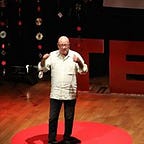RETRAINING POLICE: Technique and Recipes Are Not The Answer
Bob Deutsch
Americans tend to like techniques, recipes and painting by the numbers. It’s fast and efficient, and it takes the onus off the doer. This is totally fine for the Martha Stewart way of helping homemakers prepare a tasty meal. However, it’s oriented towards the product, not the true nature of the doer as product-maker. Technique is an overlay on the nature of being. And racial prejudice in America, historically rooted, is intrinsic to the true nature of many Americans — it’s bred in the bone, unconsciously. Many Americans do it, even without conscious intention or malice aforethought.
The recipe school of pedagogy should not be adapted to retraining police forces to refrain from using choke holds or other lethal means when less hostile ways to constrain a suspect would be sufficient. This is particularly so because history has shown a greater inclination by police to use excessive force on Black men.
* Policing does not live in isolation. Police behavior in America is a manifestation of American culture, and can only be changed with that in mind.
Black lives do matter. So does focusing on the correct level of redress so that the death of George Floyd will not be in vain. Simply instituting new training sessions for the police should not just be a matter of teaching new methods for subduing a suspected perpetrator. Only using less aggressive ways for bringing a person under control who is perceived to be involved in an ongoing criminal act does not come close to impacting the cause of racial bias towards Black men and other people of color.
Technique and Recipes v Raw Emotion
Technique and its recipes are of a different level of experience and analysis compared with raw emotion. An individual can learn a set of moves and disembodied rules, but it’s a recitation of superficially-applied actions. These kinds of rules, especially when they go against already deeply-ingrained beliefs, do not penetrate into one’s worldview and temperament. They stand outside of an individual’s sense of being and are therefore puny in the face of the raw emotion that feeds belief.
Focusing exclusively on learning a new sequence of behavior is like learning a new set of drills in a sport. All seems fine in a classroom or on the practice field, but in the game — or on the neighborhood beat — when under stress, all that learning is out the window faster than a speeding bullet or a pressed knee. Changing a way of behaving is not the same as performing a new behavior.
Any culture — including police culture — is hard to change. Culture, the narratives we author to account for and justify one’s idea of how to confirm and maximize self in the layered contexts of “I” and family and in-group and profession and society, cannot be changed via the input of isolated information or data points. That assumes life is a matter of explanation, that life can be traversed by standing outside life, decomposing it into its constituent fragments and by successive approximation, getting to a desired outcome. That point of view only takes into account the logical, rational, linear and objective workings of our frontal lobes. It’s life being lived, literally, via top-of-mind.
Real change requires not explanation, but understanding. And understanding demands living in the experience in question and in its unfolding. This is where raw emotion lives, deep in the brain’s limbic system and in the ritualized survival routines embodied in the most primitive part of the brain, the basal ganglia.
People and Their Personhood
Another way to think about the dichotomy between explanation and understanding is to consider product marketing. Yes, when advertising is great it can evoke an enduring change in culture to “think different.” However, most of the time marketing outcomes achieve little. Why? One reason is because, in general, business conceives of people only as consumers. The category “consumers” is a highly simplified transformation of people into stick-figures that are thought to just respond to hot-buttons — one-dimensional actors whose whole existence is cut into shorter and shorter snippets so that all real-life variables can be held constant.
American business, because it is all business, tends to sap all life out of how it conceptualizes people and casts on blind eye on what people really want — they want more life, more respect, more dignity, more power, more vitality and more soul — even more than they want the newest or trendiest products.
One of the biggest dangers of considering behavior as something to be explained, while not more fully understood, is things seem quickly to fall only into one of the two extreme poles — 1 or 10 — of any continuum. All intermediate assessments are usually not even considered. The “Absolutist Mind” takes charge — no nuance, no grays, no complexity. The problem with that is life mostly lives and finds its everyday fulfillments at 2 to 9.
That’s one of the things that makes Trump so dangerous. Trump makes aggravating divisions his forte. We, the American people, can do better, both in our neighborhoods and at 1600 Pennsylvania Avenue.
